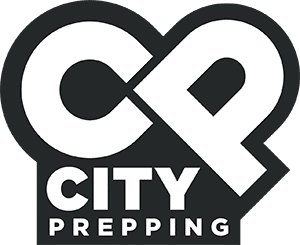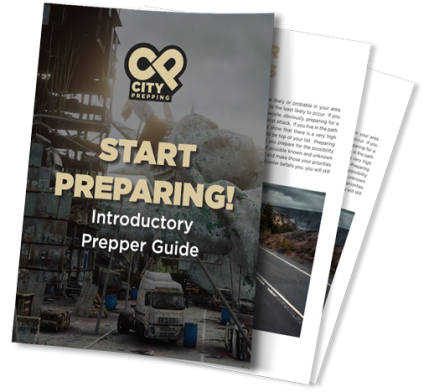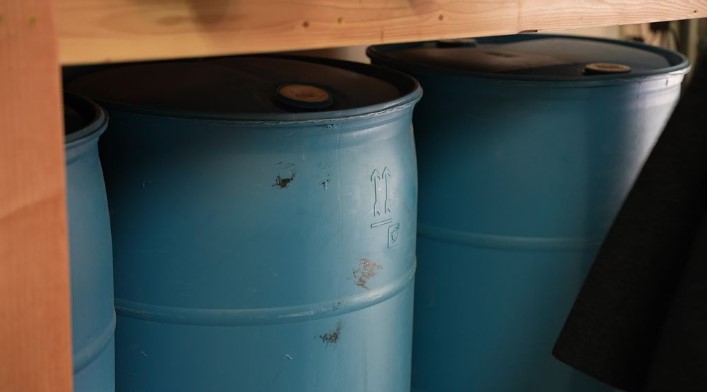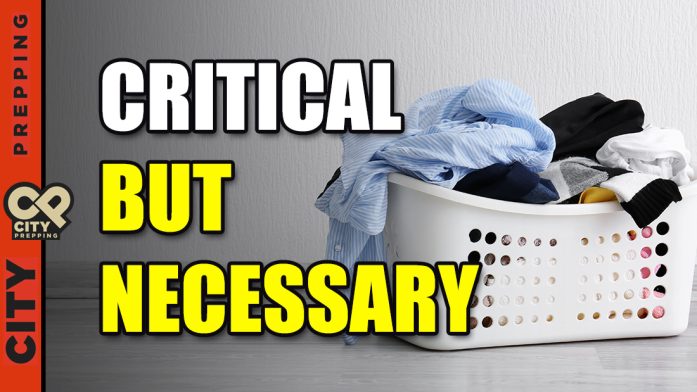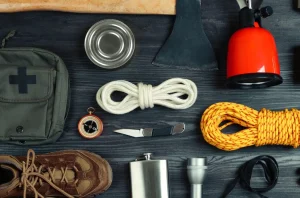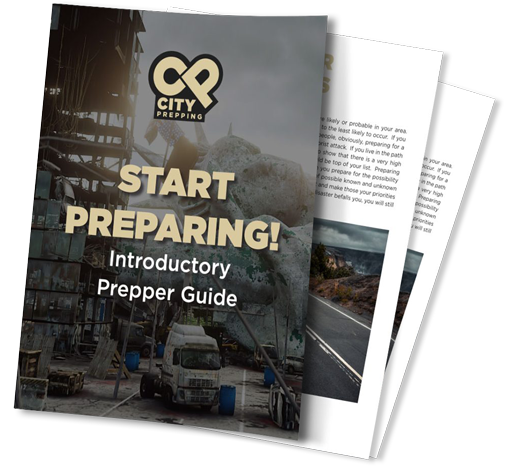 When we prep for any single event, we have the advantage of prepping for many different types of events. After all, that 72-hour container of food will be edible for the first 72-hours of any possible disaster you might face. That gallon of water you can drink in the aftermath of an earthquake, tornado, wildfire, even an EMP. While this is true for many preps, it is far more effective to prep first for the most probable events and disasters you could face. There isn’t a cookie-cutter solution to all situations regarding preps. There isn’t a one-sized fit-all solution to plugin. If you live in the southeast United States or the tropics, you should be favoring ways to treat and filter water over storing it. If you live in the southwest United States or the desert, you should be focusing on storing water first.
There are many threats that you could face and that you should prep for; however, you are better served prepping for the disasters you are most likely to encounter. Don’t prep for an EMP attack from another nation when the probability of a very real week-long power outage in your area is more probable. Still, prepping for a period of extended power outage will help you through a multitude of disasters. Don’t prep for living in a woodland outdoor environment if you live in the big city. With that all said, we face many genuine threats that we don’t prepare for. Has there been a significant flood in the historical record of your area? Are you prepared for that? Do you live in Texas, but you haven’t prepared for another significant, prolonged power outage in the middle of winter? Did you move to a hurricane, earthquake, or tornado-prone zone? Are you prepared for that event?
Planning for the wrong events can also come in the form of lopsided preps. You may have an armory in your home, but do you have water stored? You will not likely require all those weapons if it’s just a localized disaster lasting a week or two. You will need water. Your preps have to be realistic to the threats you face and comprehensive to cover all the areas required for your survival. To help you with this, City Prepping developed the Free Risk Assessment Matrix and Guide, which we’ll post a link to. We highly encourage everyone to read that blog, get the free download, fill it out, and prioritize the most probable threats. Don’t assume that you know enough about the area to prep for the right things. There’s always the possibility of the unexpected that would have been expected if you had used this free tool.
Plan for suitable events and possibilities.
2) Revealing your preps and ideas to others
When we prep for any single event, we have the advantage of prepping for many different types of events. After all, that 72-hour container of food will be edible for the first 72-hours of any possible disaster you might face. That gallon of water you can drink in the aftermath of an earthquake, tornado, wildfire, even an EMP. While this is true for many preps, it is far more effective to prep first for the most probable events and disasters you could face. There isn’t a cookie-cutter solution to all situations regarding preps. There isn’t a one-sized fit-all solution to plugin. If you live in the southeast United States or the tropics, you should be favoring ways to treat and filter water over storing it. If you live in the southwest United States or the desert, you should be focusing on storing water first.
There are many threats that you could face and that you should prep for; however, you are better served prepping for the disasters you are most likely to encounter. Don’t prep for an EMP attack from another nation when the probability of a very real week-long power outage in your area is more probable. Still, prepping for a period of extended power outage will help you through a multitude of disasters. Don’t prep for living in a woodland outdoor environment if you live in the big city. With that all said, we face many genuine threats that we don’t prepare for. Has there been a significant flood in the historical record of your area? Are you prepared for that? Do you live in Texas, but you haven’t prepared for another significant, prolonged power outage in the middle of winter? Did you move to a hurricane, earthquake, or tornado-prone zone? Are you prepared for that event?
Planning for the wrong events can also come in the form of lopsided preps. You may have an armory in your home, but do you have water stored? You will not likely require all those weapons if it’s just a localized disaster lasting a week or two. You will need water. Your preps have to be realistic to the threats you face and comprehensive to cover all the areas required for your survival. To help you with this, City Prepping developed the Free Risk Assessment Matrix and Guide, which we’ll post a link to. We highly encourage everyone to read that blog, get the free download, fill it out, and prioritize the most probable threats. Don’t assume that you know enough about the area to prep for the right things. There’s always the possibility of the unexpected that would have been expected if you had used this free tool.
Plan for suitable events and possibilities.
2) Revealing your preps and ideas to others
 We have heard it said that the first rule of prepping, like Fight Club, is you don’t talk about your preps. We both agree and disagree with this. In most cases, you should avoid discussing your preps, even with other preppers. Nobody has to know your inventory of food, water, or ammo. What good will it do that person to know? Nobody has to know what you are prepping for. You don’t even have to use the term prepping when you talk about your activities in that area. The fact is that everyone in California, for instance, should be prepped for a possible earthquake. Everyone from Texas through to Michigan should be prepared for inclement weather. Everybody on the east coast would be wise to prepare for a hurricane that could knock out services for a few days.
In the last few years, we have seen motorists stranded on freeways, power outages that lasted for several days, cyberattacks that brought critical infrastructure systems to a grinding halt, supply chain problems, cargo ships lined up off our nation’s ports, and so much more. Given that all these events recently occurred and so many more still could occur, you would be crazier for not prepping than you would be for prepping. Unfortunately, prepping has a reputation for tinfoil hat-wearing bunker dwellers. That’s not the reality of it, though. You can have a conversation about these events and tell others that you are trying to position yourself better if these events happen again. You can have the conversation and encourage others to prepare a little bit, too, without even saying the word “prepper.” Call yourself “thrifty,” “resourceful,” or “just trying to be a little more self-reliant.”
Nobody needs to know that your pantry, one of your closets, and the shelves in your basement or garage have extra food on them. Nobody has to know that you bought a solar generator and backup system. Nobody has to know about the WaterBricks stored neatly under your bed or along an interior wall of a closet wall. Nobody has to know that you have taken your canning, pickling, or soap-making skills to a whole new level. Share what you would like about your activities, and call them what you would like, but know that you don’t have to reveal anything you are doing to anyone. When you find that like-minded person who shares your interests, you can have a lot to generally talk about while glossing over the nitty-gritty details.
Don’t reveal your preps or you risk being singled out, but you also risk people showing up at your door looking for a handout when things go badly.
3) Having no specific plan
We have heard it said that the first rule of prepping, like Fight Club, is you don’t talk about your preps. We both agree and disagree with this. In most cases, you should avoid discussing your preps, even with other preppers. Nobody has to know your inventory of food, water, or ammo. What good will it do that person to know? Nobody has to know what you are prepping for. You don’t even have to use the term prepping when you talk about your activities in that area. The fact is that everyone in California, for instance, should be prepped for a possible earthquake. Everyone from Texas through to Michigan should be prepared for inclement weather. Everybody on the east coast would be wise to prepare for a hurricane that could knock out services for a few days.
In the last few years, we have seen motorists stranded on freeways, power outages that lasted for several days, cyberattacks that brought critical infrastructure systems to a grinding halt, supply chain problems, cargo ships lined up off our nation’s ports, and so much more. Given that all these events recently occurred and so many more still could occur, you would be crazier for not prepping than you would be for prepping. Unfortunately, prepping has a reputation for tinfoil hat-wearing bunker dwellers. That’s not the reality of it, though. You can have a conversation about these events and tell others that you are trying to position yourself better if these events happen again. You can have the conversation and encourage others to prepare a little bit, too, without even saying the word “prepper.” Call yourself “thrifty,” “resourceful,” or “just trying to be a little more self-reliant.”
Nobody needs to know that your pantry, one of your closets, and the shelves in your basement or garage have extra food on them. Nobody has to know that you bought a solar generator and backup system. Nobody has to know about the WaterBricks stored neatly under your bed or along an interior wall of a closet wall. Nobody has to know that you have taken your canning, pickling, or soap-making skills to a whole new level. Share what you would like about your activities, and call them what you would like, but know that you don’t have to reveal anything you are doing to anyone. When you find that like-minded person who shares your interests, you can have a lot to generally talk about while glossing over the nitty-gritty details.
Don’t reveal your preps or you risk being singled out, but you also risk people showing up at your door looking for a handout when things go badly.
3) Having no specific plan
 This is probably the biggest mistake preppers make. They take a scattergun approach and hope it comes together for them in the end when the chips are down. That doesn’t always work out. It often leaves gaping holes in their preps. This is why my approach is systematic. One of the things we teach in the Prepper’s Roadmap is to get complete preps for three main milestones– 3-days, 3-weeks, then 3-months. You can take a scatter gone approach and focus on food one month, water the next, and energy needs the month after that; however, if the disaster strikes in your second month of getting prepared, you will only have food, little water, and no power or fire.
Working from a plan saves you time in the long run. It keeps you focused and on task. It makes sure you aren’t lopsided in your preps. Working from a plan allows you to check the boxes on a proven strategy instead of sorting through thousands of hours of content in the hopes of finding a plan, strategy, and all the components that are going to work for you in your situation. Approach your prepping with a plan in hand, then build your own plans from that.
Don’t struggle to meet up after a disaster that separates you from your loved ones. Don’t try and find your pet before first going to the designated shelter, which you took the time to write the address of in your book. Don’t try and make a claim on your insurance without also having the documentation to support your claim. Have you ever struggled to remember health questions when you’re stressed? It’s far more manageable when you have the pertinent information mapped out, and that’s what we try to teach.
4) Not making a bugout bag
This is probably the biggest mistake preppers make. They take a scattergun approach and hope it comes together for them in the end when the chips are down. That doesn’t always work out. It often leaves gaping holes in their preps. This is why my approach is systematic. One of the things we teach in the Prepper’s Roadmap is to get complete preps for three main milestones– 3-days, 3-weeks, then 3-months. You can take a scatter gone approach and focus on food one month, water the next, and energy needs the month after that; however, if the disaster strikes in your second month of getting prepared, you will only have food, little water, and no power or fire.
Working from a plan saves you time in the long run. It keeps you focused and on task. It makes sure you aren’t lopsided in your preps. Working from a plan allows you to check the boxes on a proven strategy instead of sorting through thousands of hours of content in the hopes of finding a plan, strategy, and all the components that are going to work for you in your situation. Approach your prepping with a plan in hand, then build your own plans from that.
Don’t struggle to meet up after a disaster that separates you from your loved ones. Don’t try and find your pet before first going to the designated shelter, which you took the time to write the address of in your book. Don’t try and make a claim on your insurance without also having the documentation to support your claim. Have you ever struggled to remember health questions when you’re stressed? It’s far more manageable when you have the pertinent information mapped out, and that’s what we try to teach.
4) Not making a bugout bag
 Not making a bugout bag is a huge mistake. The starting point for any prepping is the bug-out bag. The bug-out bag is your survival pack that is purposefully designed to get you through a bug-out situation and help to keep you alive for at least 72 hours and probably longer. It is often overlooked because people maintain that they will just stay put or die, even though the likelihood of death is most probable if they stay put. The majority of disasters can drive us from our safe homes and the bulk of our preps. Staying in your home as a wildfire or hurricane races towards you isn’t going to be an intelligent choice. Still, many fail to pack and maintain a bugout bag with the appropriate materials needed to survive on your own for days or weeks. You should have a bugout bag for every member of your family. If you have a large dog that can carry its food after a disaster, you should have a pack for them as well. While always your best option, staying put should not be your only option.
If you take at least one bug-out bag with you on your commute or road trip, your odds of surviving if a disaster strikes and you are away from your home increase significantly. It might be enough to get you home. What you put in the bag is covered in multiple videos on this channel and elsewhere. You also have to make sure that it’s a proper weight that you can carry. You have to make sure the water and food resources in it are regularly maintained. You have to know how to use and have some practice with every single item in the bag. Think of it as a significant but super-organized purse. Or think of it as the ultimate wallet. It’s going to have the items you need when you need them to get through the first and most devastating days of whatever disaster you face. It’s going to be the foundation for surviving even longer. It’s going to contain the tools and essential supplies you need to last as long as you need to be away from your home base.
If you don’t have a bugout bag, make creating one your top priority. In doing so, you will accomplish your first milestone in prepping, which is prepping to survive the first 72-hours. Even if you don’t have to leave your house after a disaster, but the disaster strikes before payday and your cupboards are bare, you will still have what you need. If you have a bugout bag, when was the last time you unpacked it, really examined and updated its contents with items you now know are essential? Think of it like that suitcase always packed and ready, but do think of it first.
5) Planning to go it alone
Not making a bugout bag is a huge mistake. The starting point for any prepping is the bug-out bag. The bug-out bag is your survival pack that is purposefully designed to get you through a bug-out situation and help to keep you alive for at least 72 hours and probably longer. It is often overlooked because people maintain that they will just stay put or die, even though the likelihood of death is most probable if they stay put. The majority of disasters can drive us from our safe homes and the bulk of our preps. Staying in your home as a wildfire or hurricane races towards you isn’t going to be an intelligent choice. Still, many fail to pack and maintain a bugout bag with the appropriate materials needed to survive on your own for days or weeks. You should have a bugout bag for every member of your family. If you have a large dog that can carry its food after a disaster, you should have a pack for them as well. While always your best option, staying put should not be your only option.
If you take at least one bug-out bag with you on your commute or road trip, your odds of surviving if a disaster strikes and you are away from your home increase significantly. It might be enough to get you home. What you put in the bag is covered in multiple videos on this channel and elsewhere. You also have to make sure that it’s a proper weight that you can carry. You have to make sure the water and food resources in it are regularly maintained. You have to know how to use and have some practice with every single item in the bag. Think of it as a significant but super-organized purse. Or think of it as the ultimate wallet. It’s going to have the items you need when you need them to get through the first and most devastating days of whatever disaster you face. It’s going to be the foundation for surviving even longer. It’s going to contain the tools and essential supplies you need to last as long as you need to be away from your home base.
If you don’t have a bugout bag, make creating one your top priority. In doing so, you will accomplish your first milestone in prepping, which is prepping to survive the first 72-hours. Even if you don’t have to leave your house after a disaster, but the disaster strikes before payday and your cupboards are bare, you will still have what you need. If you have a bugout bag, when was the last time you unpacked it, really examined and updated its contents with items you now know are essential? Think of it like that suitcase always packed and ready, but do think of it first.
5) Planning to go it alone
 Another major mistake many make is planning to go it completely alone after a disaster. Sure, at the end of the day, the only person you can truly rely upon is yourself, but your odds of survival increase exponentially when you are networked in a group or have at least one other person who has your back. Disasters can bring out both the best and the worst of a community. We have seen several instances where neighborhoods have banded together and pooled some resources after a disaster, where they looked out for neighbors they barely knew and bonded as friends as a result of the disaster they all faced. We have also heard stories of people turning on each other and preying upon each other. The simple fact is that your odds of survival go up when you have at least one other person vested in your success. You don’t want to be in a post-disater situation when you have to determine another person’s true intent. You want to start instead building those connections of community right now.
Don’t prep in a vacuum. Take that local class on emergency preparedness, HAM radio, first aid, quilting, or canning. Take that CERT training offered through your city. Pursue a new hobby and make a friend or two. Get your kids into scouting or some other outdoor-oriented program and get involved with them to make their experience more prosperous and more rewarding. Go to church, if that’s your thing. Organize a community drive, if that’s your thing. Whatever it is, engage in your community and, in small ways, start building a community. It’s easy to look at the world and feel a little cynical, but what you see in the world, what you make out of the world, is up to you. If you look for differences, you will find differences. If you look at how we are similar, even though we may have different beliefs or viewpoints, you will find the common threads that stitch our communities together.
Given enough time, when everyone else is out for themselves, you will find you have a network of reliable people you can help, and that can help you. Don’t plan to go it completely alone, though you might have to do just that. Build other people into your plan. Someone else’s survival, someone you may not even know right now, might depend on your actions today. Your inevitable survival after a disaster might rely on what someone else chooses to do or learn right now. Like it or not, we may be an island unto ourselves, but we’re in a vast archipelago.
6) Never drilling or practicing
Another major mistake many make is planning to go it completely alone after a disaster. Sure, at the end of the day, the only person you can truly rely upon is yourself, but your odds of survival increase exponentially when you are networked in a group or have at least one other person who has your back. Disasters can bring out both the best and the worst of a community. We have seen several instances where neighborhoods have banded together and pooled some resources after a disaster, where they looked out for neighbors they barely knew and bonded as friends as a result of the disaster they all faced. We have also heard stories of people turning on each other and preying upon each other. The simple fact is that your odds of survival go up when you have at least one other person vested in your success. You don’t want to be in a post-disater situation when you have to determine another person’s true intent. You want to start instead building those connections of community right now.
Don’t prep in a vacuum. Take that local class on emergency preparedness, HAM radio, first aid, quilting, or canning. Take that CERT training offered through your city. Pursue a new hobby and make a friend or two. Get your kids into scouting or some other outdoor-oriented program and get involved with them to make their experience more prosperous and more rewarding. Go to church, if that’s your thing. Organize a community drive, if that’s your thing. Whatever it is, engage in your community and, in small ways, start building a community. It’s easy to look at the world and feel a little cynical, but what you see in the world, what you make out of the world, is up to you. If you look for differences, you will find differences. If you look at how we are similar, even though we may have different beliefs or viewpoints, you will find the common threads that stitch our communities together.
Given enough time, when everyone else is out for themselves, you will find you have a network of reliable people you can help, and that can help you. Don’t plan to go it completely alone, though you might have to do just that. Build other people into your plan. Someone else’s survival, someone you may not even know right now, might depend on your actions today. Your inevitable survival after a disaster might rely on what someone else chooses to do or learn right now. Like it or not, we may be an island unto ourselves, but we’re in a vast archipelago.
6) Never drilling or practicing
 Another big mistake many preppers make is never drilling or practicing. When was the last time you checked all the fire alarms in your home and discussed the exit strategies in the event of a fire with all occupants of your home? When did you last go camping or cook a meal entirely outdoors? When did you last use your backup generator or change the batteries in your flashlights? Where are your flashlights? Many preppers buy equipment, but they don’t put the equipment to the test before a disaster. We had a subscriber just email me that before the cold storm that went through Texas recently, he finally pulled out a generator he had bought several months before. When starting it up, it had a major malfunction. Fortunately, the manufacturer covered it, but had the power gone down in Texas, he would have been in trouble. The point here is that I wouldn’t want to find out my generator is worthless after a disaster when the stakes are much higher. By the same logic, you don’t want to pull out your solar-charged battery only to find out that there’s no charge in it. You don’t want to pull out your first-aid kit only to find out that none of the band-aids stick. Pull out your equipment and use it.
Also, pull it out from time to time to assess what you have and what you still might need. Don’t just pack a bug-out bag then forget about it. Pull it out, take it for a hike, camp overnight with it, and see if it serves your purposes. Know what you have, where it is at, how to use it, and make sure it works.
Finally, actually perform a drill and write out plans with detailed maps. In the chaos of a disaster, your mind will be preoccupied and overwhelmed with external stimuli. To keep you focused and on task, you need to have a loose procedure down, even a map or checklist. The fact is that prepping also means developing detailed plans of what to do after a disaster. If you think you have it all together, great, now go flip the circuit breaker on your house. What’s your procedure now, because the timer on your freezer is ticking. Have a fire drill with your family. Are you confident your young child will know what to do when awoken at 3 A.M., blurry-eyed and confused? Run a few safety drills to understand the plan and get everyone on the same page. And if you want to take it up a notch, turn off your utilities for the weekend to see how prepared you are.
7) No money or too much money
Another big mistake many preppers make is never drilling or practicing. When was the last time you checked all the fire alarms in your home and discussed the exit strategies in the event of a fire with all occupants of your home? When did you last go camping or cook a meal entirely outdoors? When did you last use your backup generator or change the batteries in your flashlights? Where are your flashlights? Many preppers buy equipment, but they don’t put the equipment to the test before a disaster. We had a subscriber just email me that before the cold storm that went through Texas recently, he finally pulled out a generator he had bought several months before. When starting it up, it had a major malfunction. Fortunately, the manufacturer covered it, but had the power gone down in Texas, he would have been in trouble. The point here is that I wouldn’t want to find out my generator is worthless after a disaster when the stakes are much higher. By the same logic, you don’t want to pull out your solar-charged battery only to find out that there’s no charge in it. You don’t want to pull out your first-aid kit only to find out that none of the band-aids stick. Pull out your equipment and use it.
Also, pull it out from time to time to assess what you have and what you still might need. Don’t just pack a bug-out bag then forget about it. Pull it out, take it for a hike, camp overnight with it, and see if it serves your purposes. Know what you have, where it is at, how to use it, and make sure it works.
Finally, actually perform a drill and write out plans with detailed maps. In the chaos of a disaster, your mind will be preoccupied and overwhelmed with external stimuli. To keep you focused and on task, you need to have a loose procedure down, even a map or checklist. The fact is that prepping also means developing detailed plans of what to do after a disaster. If you think you have it all together, great, now go flip the circuit breaker on your house. What’s your procedure now, because the timer on your freezer is ticking. Have a fire drill with your family. Are you confident your young child will know what to do when awoken at 3 A.M., blurry-eyed and confused? Run a few safety drills to understand the plan and get everyone on the same page. And if you want to take it up a notch, turn off your utilities for the weekend to see how prepared you are.
7) No money or too much money
 Prepping doesn’t have to be expensive, but it will cost a little bit of money. Some people make the mistake of spending gobs of money on things they will never use. Others don’t have a big chunk of expendable cash, so they think they can’t prep at all. A simple prepping activity like learning how to cook a pot of chili versus eating fast food makes you better prepared and keeps money in your pocket. Buying two cans of food and setting one aside can be the first step in building a 3-month supply of food. There is no significant difference between a penny-pinching prepper and a prepper who spends a ton of money on their prepping. If there is, we would have to say that the thrifty person probably has a few more skills and is perhaps a bit more resourceful.
We believe that spending on education, learning, and skills building is never a waste of money. Setting a little aside each month to devote to your preps gets you prepped much faster. Buying a quality product is always better than buying a cheap one when it comes to prepping. Most of all, though, we believe that having a plan in hand to direct and focus your prepping activities will guide your spending and keep costs under control all while you get to the prepping point you need to be at to survive the broadest range of disasters.
8) Overlooking a core principle
Prepping doesn’t have to be expensive, but it will cost a little bit of money. Some people make the mistake of spending gobs of money on things they will never use. Others don’t have a big chunk of expendable cash, so they think they can’t prep at all. A simple prepping activity like learning how to cook a pot of chili versus eating fast food makes you better prepared and keeps money in your pocket. Buying two cans of food and setting one aside can be the first step in building a 3-month supply of food. There is no significant difference between a penny-pinching prepper and a prepper who spends a ton of money on their prepping. If there is, we would have to say that the thrifty person probably has a few more skills and is perhaps a bit more resourceful.
We believe that spending on education, learning, and skills building is never a waste of money. Setting a little aside each month to devote to your preps gets you prepped much faster. Buying a quality product is always better than buying a cheap one when it comes to prepping. Most of all, though, we believe that having a plan in hand to direct and focus your prepping activities will guide your spending and keep costs under control all while you get to the prepping point you need to be at to survive the broadest range of disasters.
8) Overlooking a core principle
 Finally, the biggest mistake preppers make is to neglect one of the core prepping areas. Shelter, food, water, energy, medical needs, security, communication, and community are all critical aspects of prepping that have to be developed. Overlooking or lacking in any one of those core pillars of prepping will significantly reduce your odds of survival in an SHTF situation. A sack of hard beans isn’t much use to you if you lack the water and skills to cook them. Knowing how to hunt or fish isn’t going to help you if it’s unsafe to leave your house for a week or month. Not knowing where a loved one will go when a disaster strikes and they’re in the north part of town will make it difficult for you to communicate and reunite.
Lacking the energy to generate light, heat, and the most essential tool of fire will, quite literally, leave you out in the cold. You may have 3-months of water stored up, but what do you do after 3-months and a day? You have to be able to filter and treat water after your supply runs out. You have to be able to collect water safely when thousands of other people are all going to the same lake to get some water. There’s a reason tigers and crocodiles wait on the banks of waterways– the hunting is good. When it comes to community, you will need people to at least have your back a little or stay alert when you fall asleep. At the very least, you will need people to help you recover from a disaster. As they say, “Many hands make for light work.”
Don’t make the mistake of overlooking any of the eight core principles of prepping.
Conclusion
Approach your prepping like the thoughtful and methodical thing that it is. Make sure that there aren’t gaps in your prepping. You can hope on a scattergun approach to your prepping, but you better also hope you don’t have any glaring holes in your prepping when things turn south. What do you think? Is there one piece of advice you would give preppers, both new and old? In the comments below, let us all know and give this blog a thumbs up to help us build this community.
We try to read the comments and respond to them when we can, typically within the first hour of releasing a blog. Please consider subscribing to the channel if you’d like to be notified when we release a blog and give this blog a thumb-up to help the channel grow.
As always, stay safe out there.
Finally, the biggest mistake preppers make is to neglect one of the core prepping areas. Shelter, food, water, energy, medical needs, security, communication, and community are all critical aspects of prepping that have to be developed. Overlooking or lacking in any one of those core pillars of prepping will significantly reduce your odds of survival in an SHTF situation. A sack of hard beans isn’t much use to you if you lack the water and skills to cook them. Knowing how to hunt or fish isn’t going to help you if it’s unsafe to leave your house for a week or month. Not knowing where a loved one will go when a disaster strikes and they’re in the north part of town will make it difficult for you to communicate and reunite.
Lacking the energy to generate light, heat, and the most essential tool of fire will, quite literally, leave you out in the cold. You may have 3-months of water stored up, but what do you do after 3-months and a day? You have to be able to filter and treat water after your supply runs out. You have to be able to collect water safely when thousands of other people are all going to the same lake to get some water. There’s a reason tigers and crocodiles wait on the banks of waterways– the hunting is good. When it comes to community, you will need people to at least have your back a little or stay alert when you fall asleep. At the very least, you will need people to help you recover from a disaster. As they say, “Many hands make for light work.”
Don’t make the mistake of overlooking any of the eight core principles of prepping.
Conclusion
Approach your prepping like the thoughtful and methodical thing that it is. Make sure that there aren’t gaps in your prepping. You can hope on a scattergun approach to your prepping, but you better also hope you don’t have any glaring holes in your prepping when things turn south. What do you think? Is there one piece of advice you would give preppers, both new and old? In the comments below, let us all know and give this blog a thumbs up to help us build this community.
We try to read the comments and respond to them when we can, typically within the first hour of releasing a blog. Please consider subscribing to the channel if you’d like to be notified when we release a blog and give this blog a thumb-up to help the channel grow.
As always, stay safe out there. 